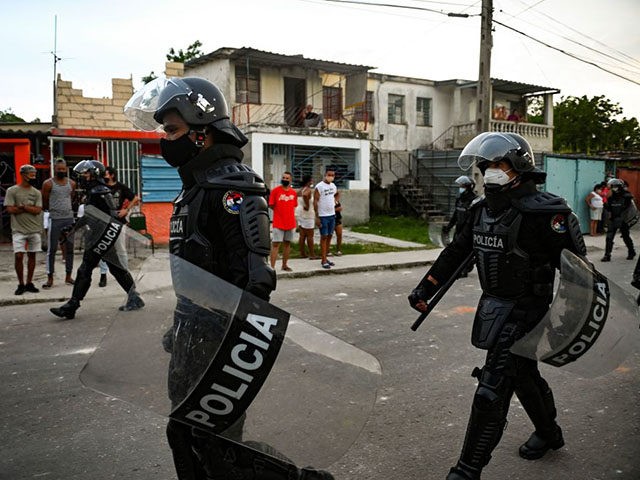The parents of a 16-year-old currently recovering from a gunshot wound incurred in a police interaction during the July 11 protests in Cuba said on Thursday that state security agents had visited the boy without parental consent in his hospital room to threaten him with prison time.
The teen, identified as Yoel Misael Fuentes García, was shot in the leg in La Guinera, a neighborhood of Havana, while attempting to approach the sounds of a tumultuous crowd he would later come to know were protesters. According to Diario de Cuba, which interviewed his step-father, Fuentes was not actively participating in anti-government protests but simply went outside to investigate the loud noises he could hear from his home.
Thousands of Cubans are believed to have taken the streets on July 11 to call for an end to the 62-year-old Castro regime. While some of the largest protests, like the one Fuentes encountered, occurred in Havana, dozens of cities nationwide reported peaceful marches and assemblies in public calling for freedom from the Communist Party. The protests were the culmination of mounting unrest during the past decade when a Castro regime emboldened by concessions under President Barack Obama greatly increased repression of dissidents, artists, and others who threatened to challenge the party line in public.
Janoi Ceballos, Fuentes’ stepfather, told Diario de Cuba that communist authorities did not allow the boy’s family into his hospital room but did allow police officers to enter the room to threaten him with prison time.
“We, the relatives, had to see Yoelito through a glass in the hospital. Meanwhile, a police officer went directly to his bed to interrogate and coerce him,” Ceballos said. “He told him that they could take him to 100 y Aldabó.”
100 y Aldabó is one of Cuba’s most notorious prisons. Survivors of the prison have accused Cuban authorities of psychologically and physically torturing inmates; it has maintained a reputation for decades of being the prison where authorities send prisoners they wish to “break” to testify against others.
Ceballos emphasized that no evidence supports any claim that his stepson participated in the protests or engaged in any criminal activity. Protests – or any publicly expressed sentiment – against the regime in Cuba often result in criminal charges such as “disorderly conduct” or the uniquely Cuban crime of desacato (“disrespect”).
“Police, attempting to disperse the protest, shot all the time against unarmed protesters. My stepson got hit in the leg and he will recover, but another person there died, his mother is doing very poorly,” Ceballos added. “Until now, no authority at any level has come to offer an apology for hurting my stepson, which would be the minimum they should do since he … just got close out of curiosity to see what was happening.”
Fuentes has since been discharged from the hospital.
The casualty toll of the July 11 protests – and subsequent protests occurring throughout the country on a nearly daily basis since then – remains largely a mystery as the Castro regime has shut down the internet nearly nationwide, imprisoned and assaulted journalists, and otherwise impeded human rights groups from keeping a tally. Officially, the regime claims only one person, Diubis Laurencio Tejeda, died in the protests. Police reportedly shot Tejeda dead in the back.
Dissident organizations on the island and families of those affected have managed to help international groups keep a better estimate of the number of imprisoned and disappeared Cubans since protests began. The Cuban Observatory for Human Rights (OCDH), an NGO operating out of Spain, revealed on Friday that as of that day, it has confirmed the arrests of 757 people across the island. Of these people, 13 are believed to be children. The group noted that it had made ample use of social media video to confirm many of the arrests and lamented that the Castro regime had shut off the internet, making those videos harder to obtain, during a press conference on Friday. It added that a nationwide manhunt continues for participants in the protests still at large.
Evidence from relatives following the ordeals of the protesters suggests that none can expect fair judgment under the law. Cuban Prisoners Defenders, an NGO that documents the malignant use of the law on the island to repress dissenters, revealed this week that the Castro regime is denying most protesters basic due process rights like the right to an attorney or the right to know what crime they are being charged with in a reasonable amount of time.
“The summary ‘trials,’ with no lawyers or possible defense, are happening simultaneously in numbers of ten accused at a time, and we have even had knowledge of cases of 30 accused [processed] simultaneously,” the organization denounced. “We are talking about hundreds of people being processed, if not thousands. Extremely grave.”
The longest processed cases, the group noted, have lasted only about 96 hours from arrest to conviction.

COMMENTS
Please let us know if you're having issues with commenting.